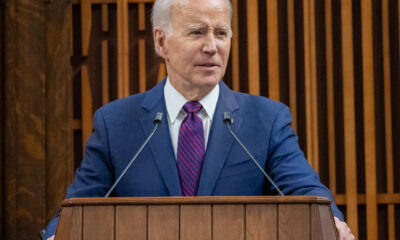Executive
The RAISE Act: real immigration reform

Hello this is Darrell Castle with today’s Castle Report. Today is Friday August 18, 2017, and on today’s Report I will be talking about the Raise Act, which stands for Reforming American Immigration for a Strong Economy Act. The discussion of this new proposal will give us a chance to take a look at current American immigration policy. The Raise Act, then, is an attempt to reform American Immigration Policy and base it on a different set of assumptions.
History of the RAISE Act
The Raise Act was proposed by Senator Tom Cotton, the junior Senator from Arkansas, who filed it in February 2017. A brief look at Senator Cotton’s background tells us that he is from a family of Arkansas farmers and that he attended Harvard University, where he graduated with honors. He then graduated from Harvard law school, but instead of practicing law, he enlisted in the United States Army, serving two separate tours in combat, one in Iraq and one in Afghanistan. The Raise Act so far has attracted one co-sponsor—David Perdue, the junior senator from Georgia.
President Trump is on board with the Act, and in fact, you will often see it cited as Trump’s immigration bill. Keep in mind that this bill seeks to reform American Immigration Policy for legal immigration, and it has nothing to do with illegal entry into the country. The Act seeks to change or reform the policy that allows people from foreign countries to legally acquire permanent resident status in the United States.
Three parts to immigration
Permanent residency
The current immigration policy of the United States consists of three basic parts and each part has many sub-parts. The first part is immigration for the so-called “green card people.” These are foreigners who are allowed permanent status in the United States with a green card. They can do anything an American Citizen can do except vote. After they’ve been here a few years, they can apply for citizenship. Immigrants can then bring as many relatives as they want, i.e., the so-called “chain migration”. Senator Cotton’s bill would limit chain migration to spouses and dependent children only.
Refugees are also included in this category. In 2016 we admitted 85,000 with refugee status; in 2015 it was 70,000; 2014, 70,000; 2013, 70,000. The Raise Act would limit refugees to 50,000 per year, so not that big a change. Also within this immigration category is the so called diversity lottery. That is where people from other countries can enter a lottery and 50,000 are selected each year for permanent residence. Last year over 14 million registered for the lottery. The vast majority of the 50,000 selected were from Africa and the Middle East. The Raise Act would eliminate the lottery altogether.
The RAISE Act point system
Immigration under the Raise Act would be based on a points system. Accepted Applications would be limited to 140,000 per year, and spouses and minor children would count against the 140,000. To be placed in the applicant pool a person would need 30 points. Points would be awarded based on age, education, English language proficiency, extraordinary achievement, i.e., a Nobel Prize winner gets 25 points, actual job offer with a salary at least 150% of what local Americans would make, and investment of money in a new enterprise. The criticism of this points system is usually that it doesn’t provide a path to entry for less skilled workers but the idea is to raise the status of the American worker by limiting foreign competition for less skilled jobs.
Guest workers
The second category of current immigration policy is guest workers. These are people who are admitted for a fixed term, not permanently, and only to perform a specific agreed upon job. The points system under the Raise Act would obviously drastically affect the guest worker program.
If the Raise Act seeks to base American Immigration Policy on a different set of assumptions as I’ve said it does, what assumptions are the current policy based on? The policy should be driven by the best interests of America and the American people, but that is not the case. Instead, I argue that it is driven by the lust for power and for money of the two dominant political parties.
The Democrats want unlimited third world immigration so they can build a permanent majority power base of low skilled, dependent, Democrat voters. Democrat politicians can then compete for power by promising more and more of the available assets of the American people who produce them. The Republicans want the same thing but for a different reason. They are completely sold out to the cheap labor lobby of the crony capitalists that they represent. More low skilled immigrants from the third world means more competition for low skilled jobs and that means lower wages and more profits for the crony capitalists. Both Parties, then, will probably oppose the points system of the Raise Act for their own high-sounding reasons.
Short-term visitors
The final category of current immigration policy is visitors. These are tourists and those coming to America for business conferences, etc. They have a temporary visa which could easily be checked if the immigration authorities wanted to do so. The biggest category of visitors is college students who come to America from other countries to attend American Universities. Often the college student visitors just stay and their visas are never checked. One of the objections that is often raised to the proposed point system is that its emphasis on education would eventually create a system of immigration dominated by smart Asians.
Summary of the RAISE Act
So I will briefly summarize the changes the Raise Act would bring to the current policy.
- Chain migration would be ended and limited to spouse and dependent children only.
- The diversity lottery of 50,000 per year would be ended.
- Refugees would be limited to 50,000 per year.
- Applicants for entry under green card rules would be limited to 140,000 per year and graded on a point system so it would favor more education and job offers.
- Guest workers would have to show a job offer paying at least 150% of the local market.
Chances of passage
I have seen estimates from ratings services that give the Raise Act only an 8% chance of passing. This is obviously for the reasons I have already mentioned but for me passing it would be a step in the right direction. It is at least the beginning of recognition that immigration policy should reflect the best interests of America and the American people.
It doesn’t go nearly far enough but it is a start. I would recommend looking at every aspect of immigration to find a best interest of America before I admitted anyone. Do we as Americans owe the rights found in our founding documents to the whole world? I would submit that we don’t and that we should carefully consider each new applicant. The number of refugees admitted should be zero for now with very few exceptions. The guest worker program we currently have is nothing but a cheap labor racket and should be eliminated. We currently admit far more college students than we should especially when you consider what it costs American students to attend Universities. American education is a finite resource and should be reserved first for American students first with a few exceptions.
Time for debate
Finally folks, immigration is not the third rail of American politics – that would be race. But it is a taboo subject none the less. Very few are willing to talk about immigration for their own reasons, and like other topics that we can’t discuss, nothing ever changes except things seem to get worse. We should be able to have open debate on immigration policy so that people can see and understand what it really is.
In fact, with a few notable exceptions, I don’t see why we need many immigrants at all right now.
At least that’s the way I see it.
Until next time folks,
This is Darrell Castle.
Darrell Castle is an attorney in Memphis, Tennessee, a former USMC Combat Officer, 2008 Vice Presidential nominee, and 2016 Presidential nominee. Darrell gives his unique analysis of current national and international events from a historical and constitutional perspective. You can subscribe to Darrell's weekly podcast at castlereport.us














